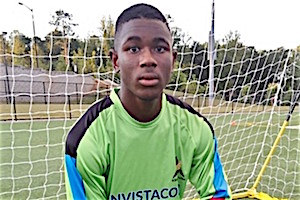English Speaking Teenager Wakes from Coma Speaking Fluent Spanish

The brain is a delicate instrument. And sometimes it breaks in remarkable ways. An American teenager has awoken from a coma, after a serious head injury following a collision during a soccer game, speaking fluent Spanish, even though his native language is English, and he only studied Spanish a little bit in school—-he was not fluent. (Contribute to his medical expenses here.)
This is a rare event, but as strange as it seems, it’s not unheard of. There have been a few historical incidents in which people, following a head trauma, have temporarily lost the ability to speak their native language, but had apparently gained the ability to fluently speak a language they only had a passing familiarity with. And a related condition, perhaps even more bizarre, called “Foreign Accent Syndrome,” leaves afflicted people speaking their own language in a strong foreign accent, as though they weren’t native speakers. In fact, one young woman was even suspected of being a German spy during World War II, when she suddenly started speaking with a strong German accent.
Medical experts aren’t entirely sure what’s going on, but they believe the brain attempts to rewire itself after serious trauma, and sometimes this rewiring process can affect language significantly. In the case of Foreign Accent Syndrome, it may not be a true foreign accent at all. Instead, after the head injury, the patients may lose partial control of the body parts necessary for speech, and the sounds they produce, in some rare cases, seem very similar to the sounds of a foreign language. It’s also possible this may happen with the people who wake up speaking a second language with apparent fluency. They really aren’t fluent, but their new pseudo-accent makes them sound more fluent.
Other experts hypothesize that the injury may suppress their speech in their native language, but not affect their second language, and since they are speaking without spending effort consciously suppressing their native language, as new language learners often do, their speech in the second language suddenly seems much better. These strange effects tend to be temporary, and slowly fade, as the patients return to their normal speech patterns.
What ever is happening, it’s clear that the human brain holds some fascinating mysteries that science has just begun to plumb. In recent years we’ve learned that the brain is much more plastic than we once thought, capable of changing and rewiring itself in unexpected ways, and repairing damage that previous generations of physicians and biologists had thought to be permanent. With this in mind, and with further scientific study along these lines, it may be possible to heal patients with brain damage from head injuries and strokes much more quickly and effectively than ever before—-perhaps completely! So as we continue to learn more, the future seems more promising than ever for accident victims, stroke patients, and other victims of traumatic brain injuries.
Learn about teenager who woke up speaking Spanish (Science Alert)
Photo: Go Fund Me

